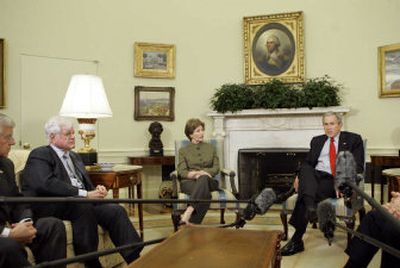Bush, Congress prepare for battle

WASHINGTON – President Bush set Wednesday night for the unveiling of his new Iraq war plan, an announcement certain to touch off a bruising battle with Congress over his expected proposal to dispatch more U.S. troops to Iraq.
Democrats on Monday reiterated their pledge not to cut off money to ground troops, but they were considering a range of other ideas to counter the Bush plan, including cutting off funding for private contractors profiting from reconstruction efforts.
They also may vote on resolutions recommending that Bush demand measurable progress from the Iraqis or begin redeploying U.S. troops. Such resolutions failed in the previous Congress, but Democrats now have two factors working in their favor: majorities in the House of Representatives and Senate, and more Republicans than a year ago who might be willing to support a phased withdrawal.
At the White House, Bush and his advisers worked on a draft of Wednesday’s speech and braced for a fight with Congress. The prime-time speech, expected to last about 25 minutes, will kick off an intensive White House effort intended to shore up support for the war. Recent polls have shown that 72 percent of Americans disapprove of the way Bush has handled Iraq.
Bush’s package is expected to include an increase of perhaps 20,000 U.S. troops, a request for funding for a jobs-creation program, renewed diplomatic efforts to get more help from Iraq’s Arab neighbors, and increased pressure on the Iraqi government to ease sectarian tensions.
Opponents of committing additional U.S. troops argue that such an escalation wouldn’t be enough to pacify Iraq’s capital city, let alone the whole country. Iraq’s Shiite Muslim-dominated government has shown no interest in cracking down on Shiite militias, Iraq’s Sunni neighbors have little interest in helping Iraqi Shiites, and economic aid would be wasted without better security, they argue.
Bush met with key Senate and House Republicans on Monday in what seemed to be an effort to shore up support within his party. But while most Republicans interviewed after the session said they generally supported the idea of more troops, some said they no longer were willing to support an open-ended commitment.
Senate Minority Whip Trent Lott, R-Miss., the No. 2 Republican in the Senate, said he wanted to see “a multifaceted plan of which the surge can be a part, but I’m not going to endorse just that alone.”
“I want to see the whole package, including ways to get the Iraqis to produce more results from their training, to get the militias under control,” Lott said. “We should make it clear to the Iraqi government that they have to do more, and that we’re not going to stay and provide them cover indefinitely.”
Sen. Christopher “Kit” Bond, R-Mo., vice chairman of the Senate Intelligence Committee, said Bush didn’t lay out a time frame or specify how many troops would be involved. But his account and that of Sen. John Cornyn, R-Texas, indicated that Bush intends to stress that Iraqis, not American forces, will take the lead in establishing security.
“The most important thing I heard him say was it represents a recommitment of Iraqi troops to take the lead and hold areas once they’ve been cleared,” said Cornyn, a member of the Senate Armed Services Committee.
On Friday, House Speaker Nancy Pelosi, D-Calif., and Senate Majority Leader Harry Reid, D-Nev., left little doubt that Congress would take steps to block the plan if Bush insisted on adding troops in Iraq. But Senate Minority Leader Mitch McConnell, R-Ky., said Monday that the only thing Democrats can realistically do “is to cut off money for the troops,” a move he termed “highly unlikely.”
Reid, however, said cutting funding to troops isn’t the only option. “There are 100,000 contractors in Iraq. I have no qualms about cutting the money that Halliburton has made from the American taxpayer, and other such contractors,” he said, referring to the company that was formerly headed by Vice President Dick Cheney.